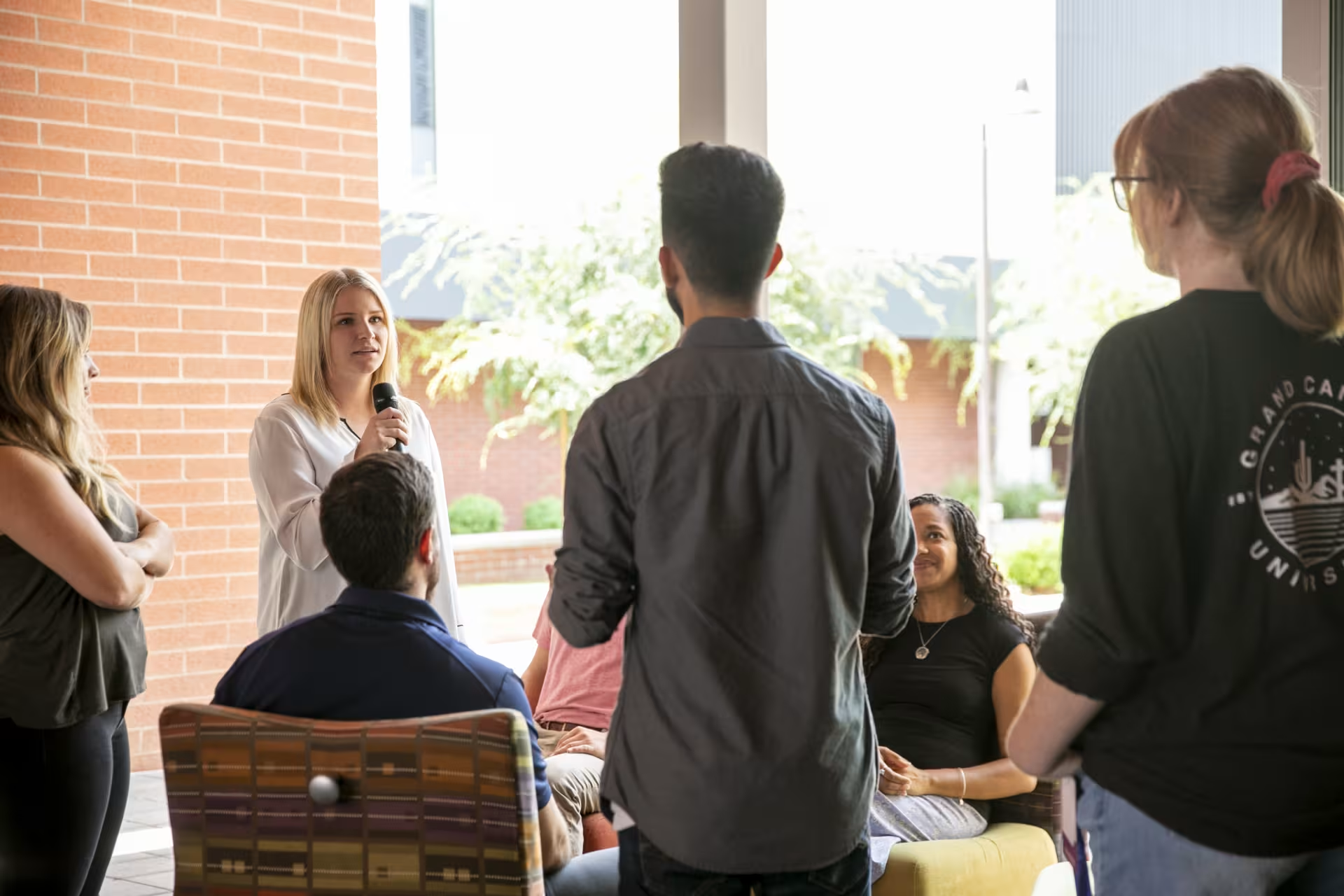
Online Master’s in Addiction Counseling Degree
Study Skills and Techniques Needed for Substance Use Counseling
Substance use and addictive disorders are diseases that negatively impact individuals, families and communities. As an aspiring addiction counselor, you have the opportunity to effect meaningful change in the lives of those in your community. The Master of Science in Addiction Counseling program at Grand Canyon University offers a curriculum that teaches evidence-based assessments and treatments for substance use disorders.
Offered by the College of Humanities and Social Sciences, this master’s degree in addiction counseling online(See disclaimer 1) blends classroom instruction with practical learning experiences. You will be introduced to matters of professional ethics, counseling theories and principles, psychopharmacology and chemical dependency in adolescents and adults. Graduates with a master’s in addiction counseling can position themselves to pursue licensure and work opportunities in various settings.

Online: $600 per credit [More Info]
Up to 12 credits or 1/3 of the total program requirements in transfer (whichever is less)
Credits: Fill out the Lopes Eval to find out what will transfer
Admission Requirements (Master's)
- Undergraduate Degree*
- 2.8+ GPA
OR 2.5+ Unweighted GPA and
- GMAT: 500
- GRE: 300 combined**
Admission requirements may differ based on degree level, program and modality, or transfer status. Some programs of study may require a higher GPA and/or other qualifying criteria for admission. Please review full admission and program requirements in the University Policy Handbook.
* Degree must be from an accredited college or program that has been approved by GCU.
** Combined verbal/quantitative, after August 2011 (1,000 combined verbal and quantitative, prior to August 2011).
Build Your Career With an MS in Addiction Counseling
If you are interested in pursuing a career as a licensed substance use counselor, obtaining a master’s in addiction counseling can help prepare you to meet the licensure requirements in most states. You can gain valuable academic skills and knowledge to enhance your qualifications for a career in addiction counseling. Below, you can explore some of the benefits of choosing GCU for your degree program.
An Online Addiction Counseling Degree Designed for Your Schedule
Our online(See disclaimer 1) master’s in addiction counseling can help you balance your studies with personal and professional commitments. The user-friendly online learning platform encourages collaboration between students and instructors, providing a supportive educational experience.
Master’s Degree in Addiction Counseling Online Coursework
The master’s in addiction counseling program features experienced instructors and focuses on skills in communication, ethical decision-making and servant leadership. Students complete a Pre-Practicum and a Practicum/Internship, which involve structured, in-person supervised fieldwork that includes counseling-related and direct-contact practicum hours. These hands-on experiences help apply classroom knowledge, refine clinical skills and build confidence in mental health settings.
The program covers key topics essential to the practice of addiction counseling, including:
Career Opportunities for Graduates With a Master’s in Addiction Counseling
Qualified counselors are necessary to address the growing need for substance use and addictive disorder treatment.(See disclaimer 2) Graduating with an MS in Addiction Counseling from GCU can position you to pursue licensure in Arizona as a licensed associate substance abuse counselor (LASAC). Depending on the specific requirements of other states, you may also be eligible to seek licensure or additional certification.
Professionals may find opportunities in the following settings:
Inpatient addiction treatment facilities
Outpatient treatment programs
Jails, prisons and juvenile detention centers
Community mental health agencies
Human services organizations
Estimated number of new substance abuse, behavioral disorder and mental health counselor jobs from 2024 to 2034(See disclaimer 3)
Median annual wage for substance abuse, behavioral disorder and mental health counselors in May 2024(See disclaimer 4)

NASAC Accreditation
The Master of Science in Addiction Counseling is programmatically accredited by the National Addiction Studies Accreditation Commission (NASAC). NASAC aims to provide legitimacy to the study of addiction science by offering structured curriculum standards and expectations for faculty. Additionally, NASAC accreditation provides purpose in the classroom, creating a connection between learned objectives and actual applications. This accreditation may benefit master’s in addiction counseling online(See disclaimer 1) graduates who are seeking state licensure as an addiction counselor.
Frequently Asked Questions
Before applying to the Master of Science in Addiction Counseling program, you may have questions. Explore these frequently asked for answers and reach out to one of our university counselors for more information.
What can I do with an MS in Addiction Counseling?
How much do you make as an addiction counselor?
What degree is best for becoming a substance and addiction counselor?
What skills do you need to be an addiction counselor?
Are addiction counseling jobs needed?
Program Curriculum
Core Courses

Begin working toward your master’s degree in addiction counseling to pursue a career in substance use and addiction recovery. Apply to GCU today!
Visit the "State Disclosures" section on the page of the program you’re interested in at gcu.edu for details on state restrictions.
Excluding residencies, practicums, internships and field experience.
- Zippia. (n.d.). Private Investigator Demographics and Statistics in the US. Zippia. Retrieved Sept. 12, 2025.
- COVID-19 has adversely affected the global economy and data from 2020 to 2023 may be atypical compared to prior years. Accordingly, data shown is effective August 2025, which can be found here: U.S. Bureau of Labor Statistics, Occupational Outlook Handbook, Substance Abuse, Behavioral Disorder, and Mental Health Counselors, retrieved Sept. 18, 2025.
- The earnings referenced were reported by the U.S. Bureau of Labor Statistics (BLS), Substance Abuse, Behavioral Disorder, and Mental Health Counselors as of May 2024, retrieved Aug. 14, 2025. Due to COVID-19, data from 2020 to 2023 may be atypical compared to prior years. BLS calculates the median using salaries of workers nationwide with varying levels of education and experience. It does not reflect the earnings of GCU graduates as substance abuse, behavioral disorder and mental health counselors, nor does it reflect the earnings of workers in one city or region of the country or a typical entry-level salary. Median income is the statistical midpoint for the range of salaries in a specific occupation. It is very unlikely that a median salary will reflect an entry-level salary. It represents what you would earn if you were paid more money than half the workers in an occupation, and less than half the workers in an occupation. It is very unlikely that a median salary will reflect an entry-level salary. It may give you a basis to estimate what you might earn at some point if you enter this career. Grand Canyon University can make no guarantees on individual graduates’ salaries. Your employability will be determined by numerous factors over which GCU has no control, such as the employer the graduate chooses to apply to, the graduate’s experience level, individual characteristics, skills, etc. against a pool of candidates.



